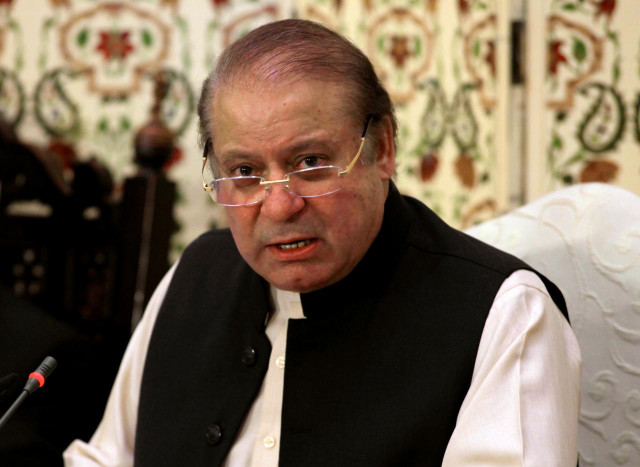Bail to Sharifs: Five-judge bench formed to adjudicate 17 law questions
CJP Nisar to head larger bench; hearing set for Jan 14

The court maintained that a plea seeking suspension of the sentence could not be heard prior to hearing the appeals.
PHOTO: FILE
The bench, headed by the chief justice, included Justice Asif Saeed Khosa, Justice Gulzar Ahmad, Justice Mushir Alam and Justice Mazhar Alam Khan Miankhel. The bench will take up the matter on January 14 -- three days before the retirement of the chief justice.
The bench will hear the National Accountability Bureau (NAB) plea on January 14 over an Islamabad High Court (IHC) verdict that suspended the conviction of deposed prime minister Nawaz Sharif, his daughter Maryam Nawaz and son-in-law Captain (retd) Muhammad Safdar in the Avenfield reference.
The three were convicted by an accountability court in Islamabad. Sharif was awarded 10-year jail term to Nawaz Sharif, seven-year term to Maryam Nawaz and one-year sentence to Captain Safdar. On their appeal, the IHC suspended the sentences and released all three on bail.
In November, a three-judge special bench of the Supreme Court raised 17 legal questions to be adjudicated by a larger bench. In its four-page order, the bench, headed by the chief justice, questioned whether the IHC could take up a constitutional petition when the main appeals were fixed for hearings.
It also asked whether a detailed order was permissible while dealing with the suspension of sentence and whether or not the IHC had ignored guidelines laid down by the Supreme Court. The bench further asked if grounds of hardship can be considered while suspending a sentence in a NAB case.
The court questioned if the IHC properly interpreted provisions of Sections 9(a)(v) and 14(c) of the Ordinance read with Articles 117, 122 to 129 of the Qanun-i-Shahadat Order, 1984 with regard to the burden of proof and presumption.
It asked whether merits of a case can be discussed and conclusive findings can be given, as done by the IHC in its order dated on September 19, 2018. It also asked whether in a case where there is a statutory ouster of jurisdiction of courts to grant bail pending appeal, the constitutional jurisdiction to grant bail can be invoked on the same principles or grounds as are available under the general law.
The bench also raised a question whether the scope of the constitutional jurisdiction for grant of bail during investigation and trial, or release on bail by way of suspension of the sentence is much wider than the scope of the grant of bail under the general law, or otherwise.
The 17 questions raised by the Supreme Court inquired about the parameters of tentative assessment of evidence and how they can be differentiated from the deeper appreciation of evidence, particularly in cases involving the grant of bail, by suspending the sentence and ordering release on bail during the pendency of the appeal.
During the hearing on Wednesday, the bench asked Sharif's attorney Khawaja Haris whether he had any objection to Justice Asif Saeed Khosa inclusion in the larger bench because he [Justice Khosa] had been part of the bench that disqualified the former prime minister through its April 20 judgment. The counsel responded that there would be no objection if Justice Khosa was made part of the larger bench.
However, a member of the Sharif family's legal team told The Express Tribune that some questions apparently suggested by NAB were not in order as these either prejudged the IHC order or raised issues which would have a direct bearing on the merits of the main appeal.
The court had also inquired whether "principles regulating bail under Sections 497 and 498 CrPC will also be applicable, while considering the matter of suspension of sentence; and if in a case the convict is entitled to suspension of sentence but the judgment suspending it is not happily worded, what would be the effect thereof".
Moreover, the bench also questioned if in a constitutional petition, "a miscellaneous application filed under Section 561-A CrPC can be filed for adjudication where the CrPC is not applicable".



















COMMENTS
Comments are moderated and generally will be posted if they are on-topic and not abusive.
For more information, please see our Comments FAQ